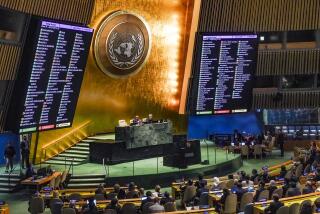U.N. Council Backs Cambodian Peace Plan on Troops
- Share via
PATTAYA, Thailand — The five permanent members of the U.N. Security Council on Friday approved a deal by Cambodians to disband most of their armies before U.N.-supervised elections.
The United Nations will send in a peacekeeping force when a formal pact is signed to end the 12-year-old civil war, according to a communique issued by the United States, China, the Soviet Union, Britain and France after five days of peace talks.
It urged the government and the Khmer Rouge-led guerrilla alliance, which have maintained a cease-fire for the last two months, to demobilize all troops before the elections.
The Cambodians should aim to sign a final pact in Paris in October, the communique said.
The parties involved in talks did not resolve two main issues--the makeup of the electoral system and the role the Interior Ministry police will play once a final pact is signed.
Prince Norodom Sihanouk, who was chairman of the meeting of the government-guerrilla Supreme National Council, said the leaders of the factions will try to clear the last two hurdles at a meeting next month in New York.
The Khmer Rouge insist that the government include its “A3” paramilitary police force in the demobilization deal, saying it is used in combat operations.
The U.N. group communique said the U.N. Transitional Authority in Cambodia would define military and police roles and decide what civilian police were necessary.
Diplomats said the more serious impasse was over the electoral system.
Prime Minister Hun Sen, who leads the current Cambodian government, favors a constituency system in which the candidate with the most votes is elected, while the guerrillas want proportional representation.
The Phnom Penh government and the guerrillas Tuesday agreed to cut troop strengths by 70%, ith the remainder handing over their weapons to U.N. peacekeepers and staying in camps.
The Cambodians reached a consensus on how to take account of the murderous rule of the Khmer Rouge during the 1970s, with the government agreeing to drop its insistence on references to “genocide” in a U.N. peace plan.
In their final communique, the five Security Council members said they backed the military accord.
More to Read
Sign up for Essential California
The most important California stories and recommendations in your inbox every morning.
You may occasionally receive promotional content from the Los Angeles Times.













